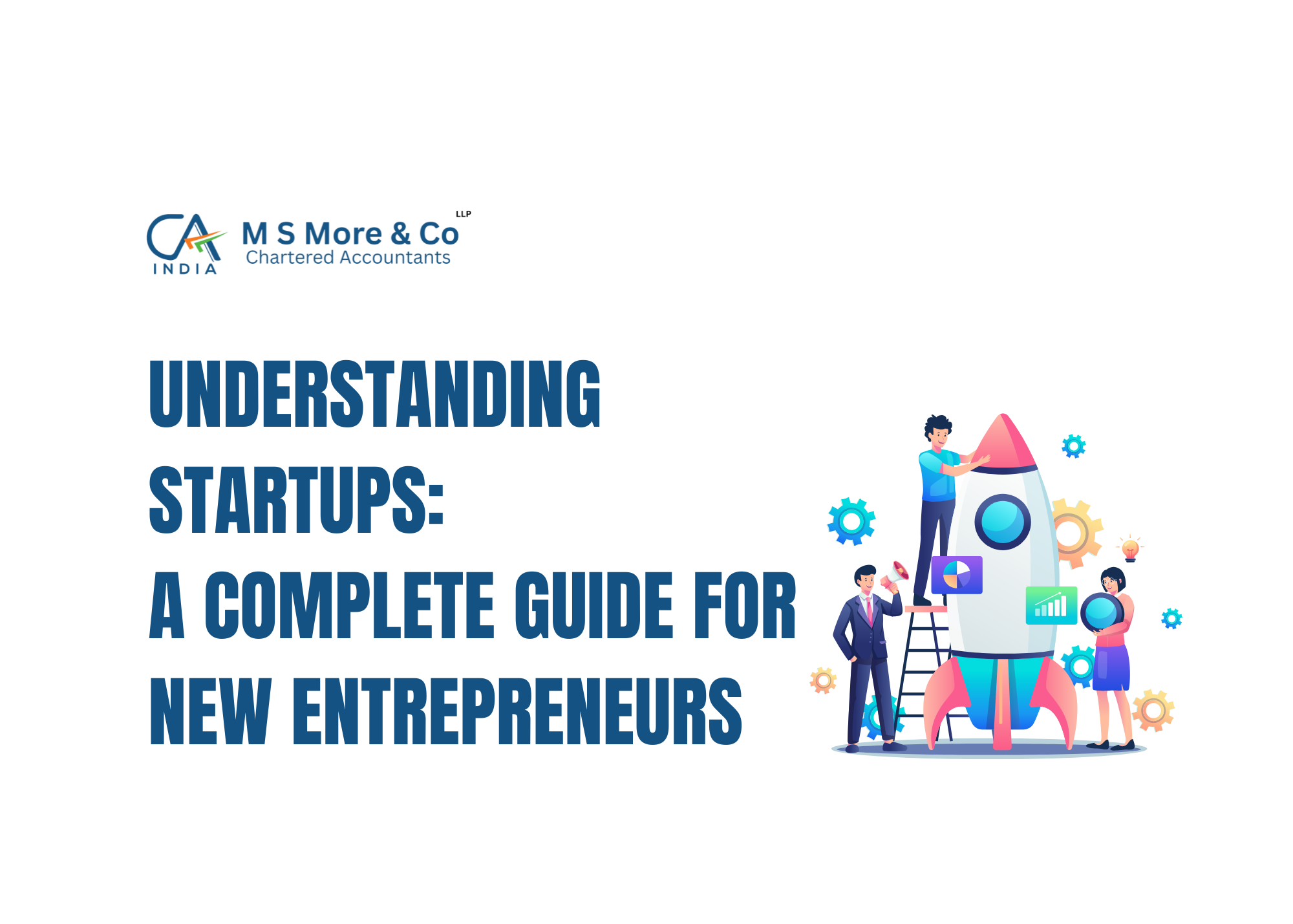India is rapidly becoming a global hub for startups. Young minds are turning innovative ideas into successful businesses across sectors like tech, fintech, education, health, and more. But building a profitable and sustainable startup takes much more than just a good idea. It requires legal clarity, proper registration, tax planning, and financial discipline—right from day one.
In this guide, we explain:
- What is Start up
- What qualifies as a startup in India
- How to register your startup with DPIIT under Startup India
- Key benefits of registration
- Challenges most startups face
What is a Startup in India?
A startup is a newly formed business that aims to solve a problem or deliver a new product/service under conditions of extreme uncertainty. Startups are often characterized by innovation, scalability, and growth potential.
To be recognized as a startup by the Department for Promotion of Industry and Internal Trade (DPIIT) under the Startup India initiative, your business must meet the following criteria:
- The business must be less than 10 years old from the date of incorporation.
- It should be registered as one of the following:
- Private Limited Company
- Limited Liability Partnership (LLP)
- Registered Partnership Firm
- The annual turnover must be less than ₹100 crore in any financial year since it started.
- The business should not be formed by splitting or restructuring an existing company.
- It must be working on something innovative—this could be a new product, service, or an improved process. It should also have the potential to create jobs or scale rapidly.
Startup Registration Process
The registration process primarily involves two key steps:
Incorporate Your Business:
First, register your business as a legal entity. You can choose one of the following:
- Private Limited Company
- LLP
- Registered Partnership Firm
Apply for DPIIT Recognition (Startup India Registration)
- Visit: https://startupindia.gov.in
- Create a profile and login
- Fill the recognition form
- Upload required documents
- Self-certify compliance with eligibility criteria
Once approved, you will receive a DPIIT Startup Recognition Certificate, which unlocks a host of government benefits.
Key Benefits of Startup Registration
Once your startup is registered under the Startup India Scheme, you can access various financial, legal, and operational advantages:
- Legal Recognition:
Being a DPIIT-recognized startup boosts your trustworthiness in the eyes of investors, customers, and government bodies.
- Tax Exemptions :
- Fund of Funds for Startups (FFS) managed by SIDBI
- Startup India Seed Fund Scheme (SISFS), which provides up to ₹50 lakh for product development or proof of concept
- Access to funding from Atal Innovation Mission, state-level incubators, and VCs
- IPR Incentives:
- 80% discount on patent filing fees
- 50% discount on trademark fees
- Free assistance from government-approved IPR facilitators
- Simplified Compliance:
Startups can self-certify complianceunder 9 labour laws and 3 environmental laws for five years, reducing inspections and legal hassles.
- Easy Exit:
The Insolvency and Bankruptcy Code (IBC) facilitates fast-track closure within 90 days, providing a streamlined exit strategy if needed.
- Mentorship & Incubation:
Registered startups gain access to valuable resources such as incubators, accelerators, co-working spaces, and programs like Startup Yatra, National Startup Awards, and hackathons.
Challenges Faced by Indian Startups
Despite comprehensive support, Indian startups frequently encounter several hurdles:
- Limited Access to Capital: Especially in early stages and beyond metropolitan areas.
- Regulatory Complexity: Navigating frequent compliance requirements can be challenging.
- Infrastructure Gaps: Poor logistics, internet access, or utilities can delay or disrupt business operations, especially in Tier-2 and Tier-3 cities.
- Talent Acquisition Difficulties: Startups often can’t match the salaries or job security offered by bigger companies, making it hard to attract and retain skilled employees.
- Business Inexperience: Founders often face a learning curve in areas like operations, marketing, and scaling.
- Founder Burnout: High stress and limited support systems can lead to burnout.
Importance of Financial Discipline in Startups
A brilliant idea alone isn’t enough to build a successful startup. Poor financial planning is one of the top reasons startups fail. That’s why financial discipline is crucial from day one.
Here’s how founders can stay financially sound:
- Budgeting & Cash Flow Monitoring
A clear monthly budget helps you plan and control expenses. Cash flow monitoring ensures you don’t run out of money while waiting for revenue or funding. Always maintain a cash reserve for emergencies and track every rupee in and out.
- Financial Projections for Funding
Investors want to see realistic financial forecasts. Preparing projected income, expenses, and profit & loss statements helps build investor trust and gives you clarity on your growth path.
- Track Profit Margins & Burn Rate
Your profit margin shows how efficiently you operate, while burn rate reflects how fast you spend your funds. Keep these under control to ensure your startup survives until it becomes profitable—or raises the next round of funds.
- Hire a Virtual CFO
Can’t afford a full-time CFO? A Virtual CFO offers expert financial support on a part-time basis. They help you manage budgeting, reporting, compliance, and investor presentations—keeping your finances investor- and audit-ready.
Final Thoughts
India’s startup ecosystem is growing stronger by the day, thanks to programs like Startup India. Registering your startup not only unlocks significant tax benefits and funding opportunities but also builds your credibility as a business.
However, to truly succeed, you’ll need more than registration—you’ll need the right guidance, strong financial planning, and the ability to adapt quickly in a dynamic market.


Very useful information
Next week appointment..